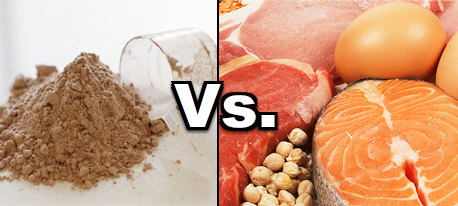Which One Is Better For You?
Supplements
are near to obligatory in the bodybuilding world. Nowadays almost everyone is
using Creatine, which has become a key landmark. The contemporary bodybuilder
can get marvelous results from using the substances that have stood the test of
time. However, even though there are plenty of perfectly balanced supplement
drinks out there, they'll never take the place of actual food.
You've
spotted the advertisements: "Natural herbs dissolve pounds– without diet
or exercise," or "incredible new finding heightens physical
performance!" Having trouble believing these ads? Dietary supplements are
products that comprise vitamins, minerals, amino acids, herbs, or botanicals –
or any concentration, extract, or combination of these – as part of their
ingredients. How safe are they? Are supplements truly superior to food?
Did
you ever observe how articles about supplements in certain bodybuilding
publications are hardly ever objective? They all appear to be slanted towards
hyping some "radical" new product. It certainly
pyramid
sounds
credible when protein companies toss around fancy words like cross flow micro
filtration, oligopeptides, ion exchange, protein efficiency ratio, biological
value, nitrogen retention and glycomicropeptides, particularly when scores of
scientific references are quoted.
It
could be disputed that never in history has so much been spent on the marketing
and buying of any goods, with so little information on the merchandise itself,
on the part of either the supplier or purchaser, as has been spent on vitamin
and mineral supplements. Billions are being spent yearly, and the majority of
the buyers, wholesalers, retailers or direct-to-the-consumer salespeople do not
know the distinction between a synthetic, a crystalline, and a truly natural
vitamin, or the difference between a chelated organic and an inorganic mineral.
Americans
are now paying out in excess of $17 billion a year for supplements for health
and wellness. Yet, one thing seems quite clear: for the most part supplements
aren't helping very much. There certainly are helpful supplements, but their
users must first deal with the fundamentals of health and nutrition.
The
demographic group of 15 to 25 year olds – known as "Millennials" – is
now rising as a commanding force for determining trends in food and nutritional
supplements. This information augurs well for the prospects of functional
foods, organic produce, various nutritional and of course sport supplements.
Participants in a recent study named food's vitamin content as one of their top
five priorities: freshness was at the very top of the list, in fact.
Milk vs. Calcium Supplements
The
majority of people can best meet their calcium requirements through food. Ideas
for action to improve calcium intake:
Learn
which foods are rich sources of calcium.
Take
pleasure in calcium-rich foods such as milk, cheese and yogurt every day.
Keep
track daily of the number of servings of milk products that you consume.
Talk
about your concerns with a registered dietitian, doctor or pharmacist if you
are not capable of meeting your calcium requirements through food.
Supplements
For Improved Sports Performance
Anybody
who is serious about sports performance nowadays is looking for an edge,
frequently in the form of a useful and safe supplement to improve limits of
athletic performance and achievement. Finding the right performance enhancer
can be a challenge, bearing in mind the quantity of selections available.
Before looking at what supplements can do, it's important to note what they
can't do: no product can make up for a poor diet.
Creatine
Works
Creatine
is an amino acid found primarily in skeletal muscles, which plays an important
role in muscle contraction. It helps reload ATP, a chemical that is the direct
source of energy for all muscle contractions. The availability of Creatine also
delays the manufacture of lactic acid; the substance that causes the famous
"burn" that can ultimately shut down the muscle.
The
Food Guide Pyramid
The
US Government updated the Food Guide Pyramid in 2005. This pyramid is designed
to remind people of what they should eat to stay healthy. It shows food groups
as a series of differently sized colored stripes of different widths to show
how much of a person's daily food intake should be made up of that food group.
It helps people to remember the following key points: Combine exercise with
eating well
Eat
a variety of foods
Eat
foods in moderation
Most
foods are made of carbohydrates, fat or protein. Carbohydrates are the sugars,
starches and fibers found in plants foods, and are your body's main source of
energy, so they should provide the bulk of your calories – about 50-60 percent
of your daily intake. Fat, also a concentrated source of energy, should supply
no more than 30 percent, with protein providing the rest.
Nutrition Supplements: Science vs. Hype
Aggressive
advertising has directed millions of recreational and elite athletes to use
nutrition supplements in hopes of improving performance. Nutrition supplements
are a profitable business in the United States. These supplements are sadly
subject to little regulation by the US Food and Drug Administration. This lack
of regulation can bring about dishonest marketing, impurities in manufacturing,
and potentially hazardous reactions among supplement users.
The
choice is clear when it comes to whether to use real foods or dietary
supplements. The big advantage of food over supplements is that real food
contains multiple nutrients. People need a variety of nutrients and fiber to
stay healthy. Supplements can be useful, but they don't offer a total
nutritional package. The bottom line is to eat a variety of food from all the
food groups and don't be over-reliant on food supplements.
Please make sure to visit and like our page in facebook for more: https://www.facebook.com/To-GYM-603113973185732/
Source: http://www.illpumpyouup.com

Aucun commentaire:
Enregistrer un commentaire